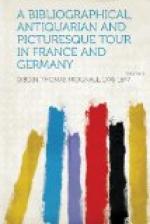peut le condamner pour le fait, il faudra toujours l’absoudre pour
l’intention....” The concluding-sentence need not be copied: it is
bad taste to re-echo the notices of one’s own good qualities.
My Norman translator at least takes leave of me with the grace of a gentleman: although his thrusts have been occasionally direct and severely intended. The foil which he has used has not always had the button covered. The candid reader will, however, judge how these thrusts have been parried; and if the “hits” on the part of my adversary, have been sometimes “palpable,” those of the original author will not (it is presumed) be deemed feeble or unimpressive. After all, the sum total of “Errata” scarcely includes THREE of substantial moment: and wishing Mons Licquet “a very good day,” I desire nothing better than to renew our critical coqueting on the floor of that Library of which he is the “Bibliothecaire en Chef.”
END OF VOL. I.
London: Printed by W. Nicol,
Cleveland-row, St. James’s.
SUPPLEMENT TO VOL. I.
OLD POEM ON THE SIEGE OF ROUEN.
The city of Rouen makes too considerable a figure in the foregoing pages, and its history, as connected with our own country in the earlier part of the fifteenth century, is too interesting, to require any thing in the shape of apology for the matter which the Reader is about to peruse. This “matter” is necessarily incidental to the present edition of the “Tour;” as it is only recently made public. An “Old English Poem” on our Henry the Fifth’s “Siege of Rouen” is a theme likely to excite the attention of the literary Antiquary on either side of the Channel.
The late erudite, and ever to be lamented Rev. J.J. Conybeare, successively Professor of the Saxon language, and of English Poetry in the University of Oxford, discovered, in the exhaustless treasures of the Bodleian Library, a portion of the Old English Poem in question: but it was a portion only. In the 21st. vol. of the Archaeologia, Mr. Conybeare gave an account of this fortunate discovery, and subjoined the poetical fragment. Mr. Frederick Madden, one of the Librarians attached to the MS. department in the British Museum, was perhaps yet more fortunate in the discovery of the portion which was lost: and in the 22d. vol. of the Archaeologia, just published, (pp. 350-398), he has annexed an abstract of the remaining fragment, with copious and learned notes. This fragment had found its way, in a prose attire, into the well-known English MS. Chronicle, called the BRUTE:—usually (but most absurdly) attributed to Caxton. It is not however to be found in all the copies of this Chronicle. On the contrary, Mr. Madden,




